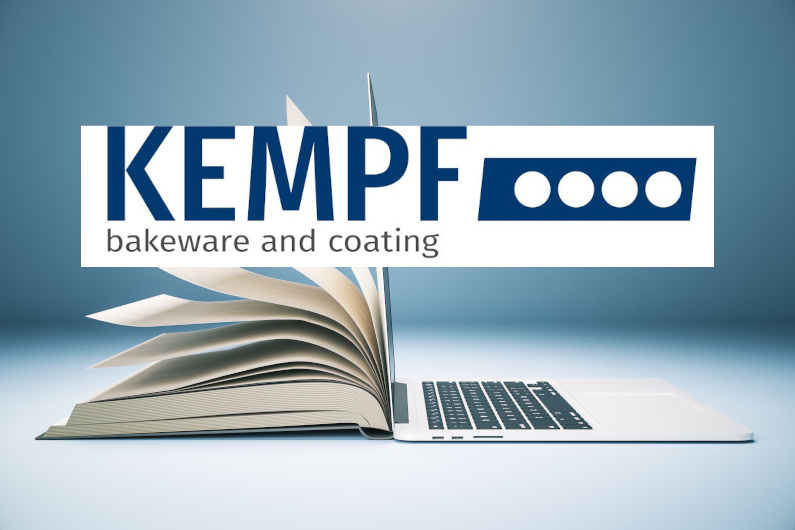
The benefits of innovative, custom-made bakeware only begin with providing support for baked goods throughout manufacturing. Minute details in their make-up, design, coating and handling amount to a lot in terms of efficiency and bring significant process improvements in industrial baking.
Trays used for automated, industrial lines must be able to withstand constant mechanical handling, and, in many cases, their own large size and considerable weight, plus the load of products deposited on them. There is also the temperature challenge, going from -40°C to 270°C. Most industrial trays have a robust stainless-steel frame to support weight and excessive handling. “They are made to measurement with absolute accuracy to ensure a smooth production process. Securing accurate bakeware measurements is extremely important for a smooth operation of the lines, avoiding crashes and maintaining packaging requirements,” Guido Kempf, Kempf CEO, details. The company provides special micro-perforations of 1.6 or 2.0mm, various mold designs, styles, perforations, and coatings, respecting the specifications of the manufacturer of the line and the customer requests.
The lifespan of baking pans and trays relies on the quality of the materials they are made of, the coatings protecting them, and the way they are handled. One of the most common causes of bakeware damage is their cleaning process, Kempf illustrates: using the wrong cleaning agent, for example, can dramatically reduce the number of baking cycles or even cause irreversible damage to the nonstick coatings. Innovation seeks to bring upgrades to pans’ properties while looking to enhance the entire baking process they travel through.
The impact of a tray’s micro-perforations on cleaning depends on the products being baked: although, on the one hand, in a standard baguette production, there is almost no need to clean the trays, for instance, passing them through a brushing system with soft plastic bristles is always a plus, Kempf recommends. On the other hand, for products decorated with seeds, flour or sprayed liquid ingredients, where the perforations tend to get clogged after a while, washing the trays in-line, or outside is required. There are several good technologies for in-line brushing and/or washing of trays and tins available in Europe.
Wanted: automation and flexibility
With higher output and more efficiency in mind, the company has recently invested in new custom-made equipment such as continuous coating lines, stamping presses and a state-of-the-art station for tray cutting, folding, and laser engraving – in response to needs for automation and more flexibility they observed. Kempf highlights the work of the company’s R&D team: “Our main goals are to constantly increase our high levels of quality, productivity, and sustainability, always bearing in mind the wellbeing of our staff and the focus on competitiveness.” Among the newest advancements, he shares, is that the new coatings KG-Flon 734 and KG-Flon 970 are suitable for doughs high in sugar, with perfect non-stick characteristics.
In general, Kempf’s production lines are highly automated, to achieve a consistent quality of the products. The metal punching equipment is singled out by the company’s CEO for its very fast, precise, and clean perforations on both sides of the aluminum sheets, which is extremely important for safety and coating purposes.

Coatings make the difference
The quality of the trays doubled with that of the coatings will influence their efficiency. Correctly identifying the best non-stick coating for specific needs, and then ensuring their protection throughout their life cycle implies many different approaches. The bad news is that there is no one-size-fits-all solution; however, that is also the good news, as the final choice will be a perfect match for each production environment. “There are many factors to be considered before we can decide which nonstick coating to offer: such as, recipes, ingredients, processes, equipment, room conditions (temperature, humidity, etc.),” according to Kempf.
The company goes into detail with specific questions for their customers and, if possible, will also observe every process on-site. Kempf constantly contacts its raw material suppliers for coatings to identify the best and newest technologies. This is the case of their recent work with a leading Swiss supermarket chain, for example: “They were looking for a better coating solution for their in-house bakeries, where they still produce a wide variety of products with long proofing times and other demanding parameters every day. Then our premium Teflon coating KG-Flon 704 green was the perfect choice thanks to its non-stick properties. After the introduction of KG-Flon 704 green, we were able to solve their problems, saving them time, money, and cleaning efforts, and reducing the amount of waste in their bakeries,” illustrates Kempf.
From Kempf’s perspective, the biggest technology advancements in bakeware over the past 10 years are coming from innovation in coatings. “Many companies have switched from silicone rubber to fluoropolymer (e.g. Teflon) coatings. We are constantly in contact with our suppliers of coating materials, testing new systems and trends, looking for more sustainable solutions and the best baking results,” Kempf shares. In this regard, improved heat resistance is one of the items on the company’s R&D board. Kempf is aiming to bring the best technology and materials to the drawing board of the bakeware it produces. For example, the company has recently upgraded the abrasion resistance of its premium Teflon coating KG-Flon 704 green, which can now successfully withstand 15% more baking cycles.
Peelboards
Special products require special support: Kempf offers peelboards for handling special doughs (i.e., rye dough, or highly hydrated doughs), for their excellent non-stick properties. They are a versatile choice for all kinds of products, regardless of size or flour sprinkling, and can be used for manual, semi- or fully automatic loading, on racks or conveyor belts. Specialty products often imply premium ingredients and costly waste; hygiene is a priority in the design of the peelboards, so they can be cleaned quickly and efficiently, either manually or automatically. “The method (brushing, dry/wet) and the need for a cleaning agent will depend on the type of product and operation,” Kempf adds.



